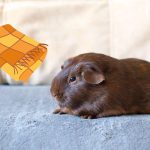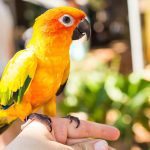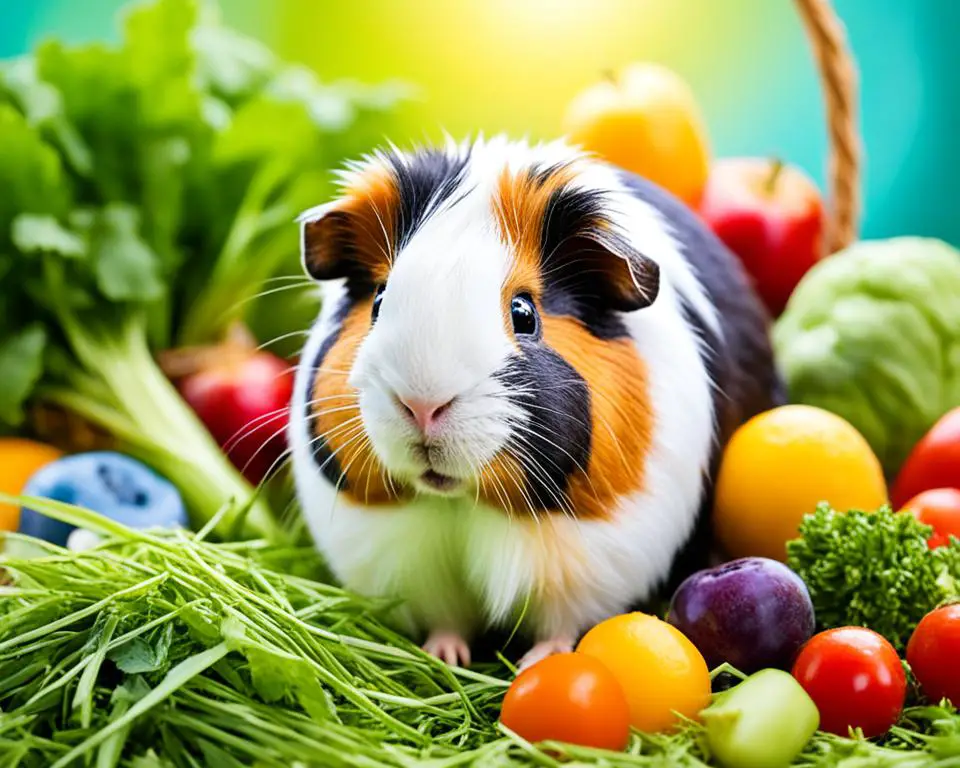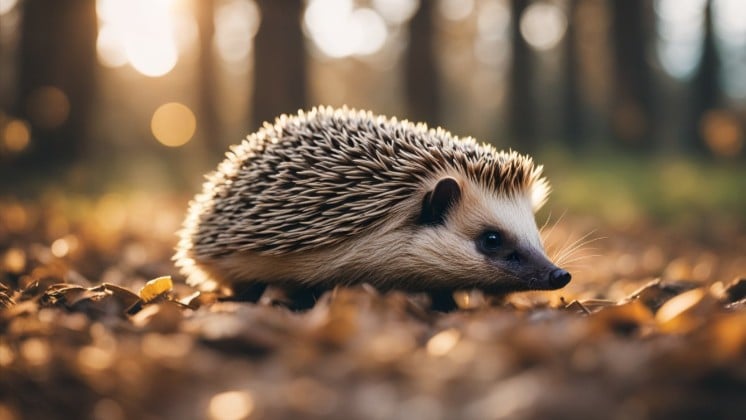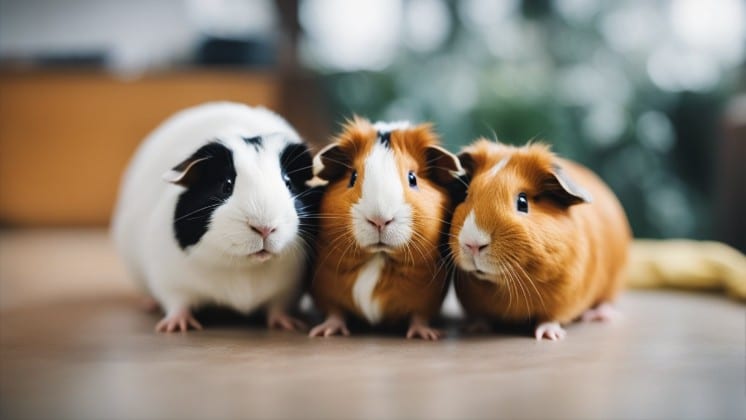Guinea pigs are known for their adorable looks and friendly nature, making them a popular choice among pet enthusiasts. These little creatures require a specific diet to stay healthy and thrive. The question many people ask is, do guinea pigs eat a lot?
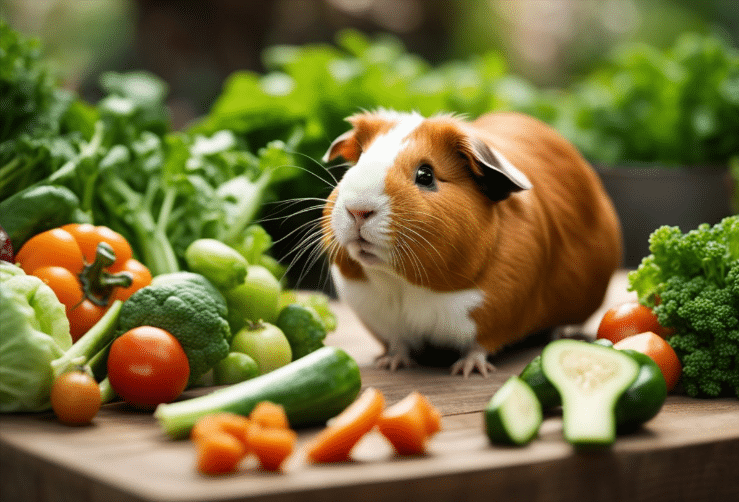
The simple answer is that guinea pigs need a well-balanced diet to meet their nutritional requirements and to maintain optimal health.
Ensuring they have a varied blend of hay, fresh foods, vegetables, commercial pellets, and supplements, along with freshwater, will determine the amount of food consumed.
Every guinea pig is unique, which means their individual feeding habits and quantity may vary depending on factors like age, size, and activity level.
Considering the important factors in guinea pigs’ diet and understanding how these elements play a role in their overall health will help you provide proper care and nutrition to your furry friend.
Key Takeaways
- A well-balanced diet of hay, fresh foods, vegetables, pellets, and supplements is crucial for guinea pigs.
- Individual feeding habits and quantity can vary depending on factors like age, size, and activity level.
- Understanding and providing proper nutrition contributes to the overall health and well-being of your guinea pig.
Guinea Pig Dietary Basics
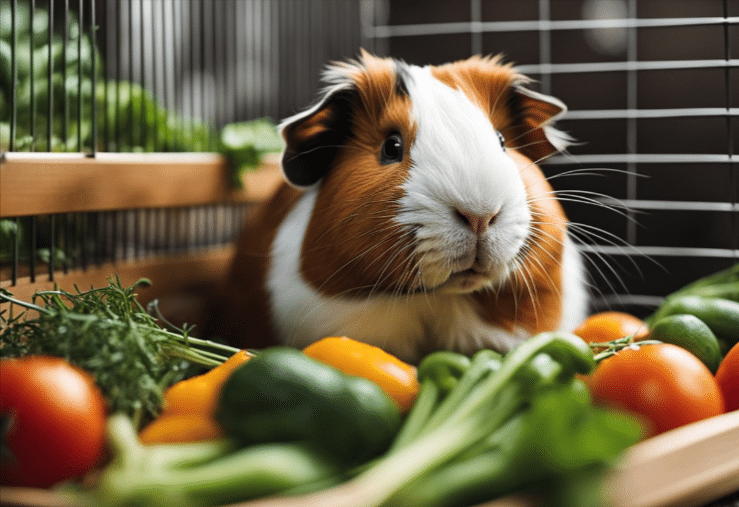
Herbivore Nutrition
Guinea pigs are herbivores, which means their diet mainly consists of plant-based foods. As an owner, it’s essential to provide your guinea pigs with a combination of high-quality hay, fresh vegetables, fruits, and specially formulated guinea pig pellets.
Hay should make up the majority of your guinea pig’s diet, around 80-90%, as it is rich in fiber and helps wear down their constantly growing teeth. A good quality Timothy hay should always be available for your guinea pigs.
Vegetables and some fruits should make up around 10-15% of their diet. Leafy greens, bell peppers, and the occasional carrot are all suitable options. While fruits should be limited to small amounts, they can provide vitamin C, which is crucial since guinea pigs cannot produce this vital nutrient themselves.
Guinea pig pellets should be around 5-10% of their diet. These pellets should be formulated specifically for guinea pigs, containing vitamins and minerals to supplement their daily requirements. Avoid using rabbit or other small animal pellets, as they lack specific nutrients required by guinea pigs.
Dietary Requirements by Age
Guinea pigs’ dietary requirements vary as they grow. Here’s a brief overview of their nutritional needs by age:
- Young guinea pigs (0-6 months): Provide unlimited access to pellets, hay, and water, as they need extra nutrients for growth.
- Adult guinea pigs (6-24 months): Continue to offer unlimited hay and water. However, limit pellets to about 1/8 cup per day, depending on their weight and activity level.
- Senior guinea pigs (over 24 months): When guinea pigs reach their senior years, their dietary needs may change. Check with your veterinarian for any specific adjustments to ensure they maintain a healthy weight and receive necessary nutrients.
Remember that the dietary needs of your guinea pig will also depend on factors like their weight, activity level, and overall health. Be sure to consult with your veterinarian to tailor a diet plan that ensures your guinea pig remains happy, healthy, and thriving.
The Role of Hay in a Guinea Pig’s Diet
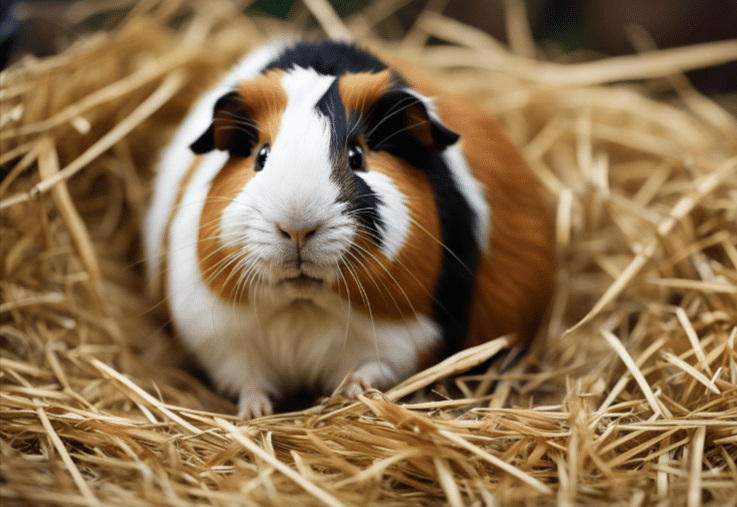
Guinea pigs require a diet that is rich in hay, as it provides them with essential nutrients and fiber. Hay also plays a crucial role in maintaining their dental health. In this section, we will discuss the importance of different types of hay in your guinea pig’s diet.
Timothy and Orchard Hay
Timothy and orchard hay are the two most common types of hay that guinea pigs consume. Both are rich in fiber and low in protein and calcium, making them a perfect choice for your guinea pig’s daily diet. They help in digestion and also promote healthy gastrointestinal function.
When feeding your guinea pig timothy or orchard hay, ensure that it is always fresh and available. Replace stale hay with fresh hay as needed, and provide an ample supply for your guinea pig to graze on throughout the day.
Alfalfa Hay
Unlike timothy and orchard hay, alfalfa hay is high in protein, fat, and calcium. While it can be beneficial for young guinea pigs that are still growing, it is not suitable for adult guinea pigs as a daily staple. Feeding your guinea pig alfalfa hay regularly can lead to weight gain and obesity, which can negatively impact their health. Instead, you can provide alfalfa hay as an occasional treat or supplement for your guinea pig.
Hay and Dental Health
One of the most crucial reasons to include hay in your guinea pig’s diet is to maintain their dental health. Guinea pig’s teeth grow continuously throughout their lives, and chewing on hay helps to wear down their teeth and prevent overgrowth.
Incorporating hay into your guinea pig’s feeding routine ensures they are getting the right balance of nutrients while also keeping their teeth in check.
Remember to always provide fresh hay for your guinea pig to ensure they are receiving the maximum nutritional benefits from their diet.
Fresh Foods and Vegetables
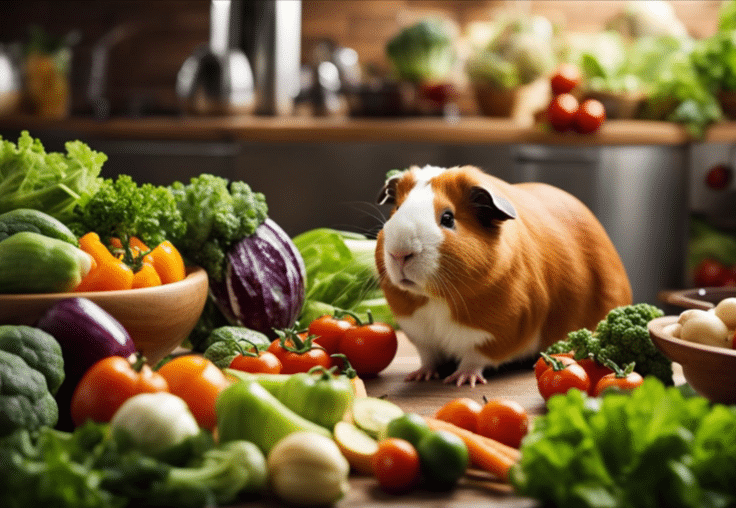
Safe Vegetables and Fruits
Guinea pigs can eat a wide variety of fresh vegetables and fruits. Leafy greens, such as lettuce, kale, and spinach, should be a staple in their diet. It’s essential to give your guinea pig other vegetables as well, like broccoli, bell pepper, cucumber, carrots, and romaine lettuce. Make sure to keep a balance and do not overfeed your guinea pig with these choices.
Fruits can be given as a snack in moderation. Some guinea pig-safe fruits include blueberries, strawberries, kiwi, and apple.
Keep in mind that fruits should be given occasionally due to their sugar content. Also, always remove seeds, as they can be harmful to the guinea pig’s health.
Foods to Avoid
While fresh vegetables and fruits are essential for your guinea pig, some foods should be completely avoided. Items such as onions, garlic, grapes, raisins, avocados, and chives are potentially toxic to guinea pigs and should not be part of their diet.
When selecting fresh foods for your guinea pigs, always check their safety before offering them to your pets. Keep their diet balanced and follow the recommended feeding guidelines to ensure your guinea pigs live long and healthy lives.
Commercial Pellets and Supplements
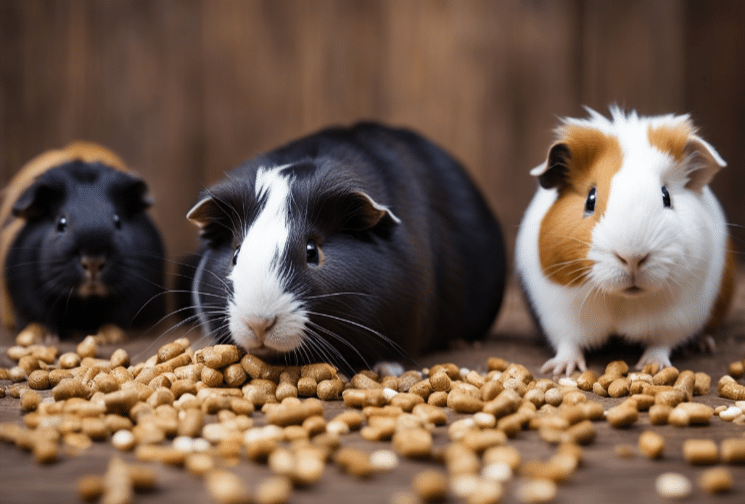
Choosing Quality Pellets
When deciding on pellets for your guinea pig, it’s essential to choose high-quality ones that contain the necessary nutrients, such as Timothy hay based pellets. Some of the key characteristics to consider are:
- Pellets should be made primarily from Timothy hay or similar grass hay. Avoid Alfalfa hay since it contains excessive amounts of calcium and protein.
- Fortified pellets with added vitamins and minerals, such as vitamin C, are recommended to ensure your guinea pig gets the proper nutrition.
- Avoid pellets with added sugars, artificial colors, and preservatives, which can be harmful to your guinea pig’s health.
Some popular brands known for providing quality pellets are Small Pet Select Premium Guinea Pig Food Pellets and Oxbow Essentials Adult Guinea Pig Food.
Supplementing with Vitamin C
Guinea pigs, unlike many other animals, need a regular supply of vitamin C since they cannot produce it internally. This is why it’s critical to provide your pet with vitamin C via their diet. Here are some tips on meeting your guinea pig’s vitamin C requirements:
- Fortified Pellets: Look for pellets that are fortified with vitamin C. This will ensure a steady source of vitamin C through regular feeding.
- Fresh Vegetables: Include vitamin C-rich vegetables in your guinea pig’s diet, such as bell peppers, kale, and broccoli.
- Supplements: If your guinea pig’s diet is lacking in vitamin C, consider adding a supplement. There are special vitamin C tablets and liquid drops available for guinea pigs.
Note: Always consult your veterinarian before supplementing your pet’s diet.
By providing your guinea pig with quality pellets and the proper vitamin C intake, you can support its overall health and well-being. Remember to also include a variety of fresh vegetables and unlimited hay for a balanced diet.
Water Consumption
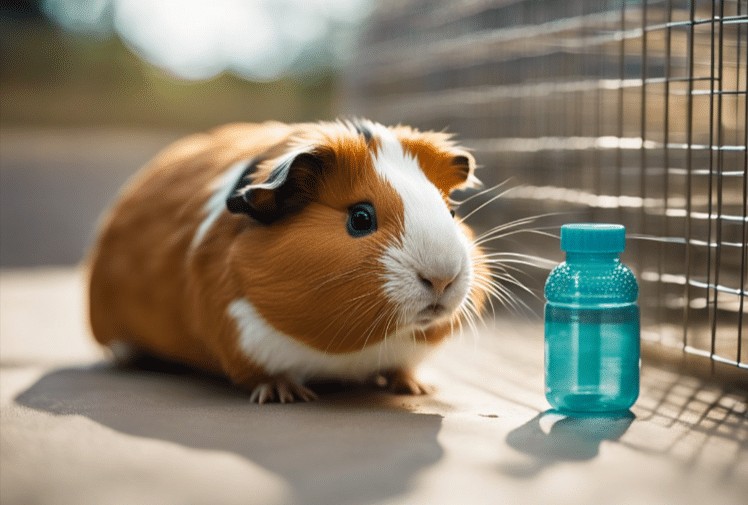
When it comes to your guinea pig’s hydration, it is essential to monitor their water consumption. Guinea pigs typically consume around 100-150 ml of water per day. However, this amount can vary depending on factors like diet and environment.
Water consumption can be influenced by temperature and humidity. During summer months, your guinea pig might drink more water.
Similarly, if your guinea pig’s cage is kept in a dry environment, the animal will likely consume more water due to seasonal changes. Always ensure that your guinea pig has access to clean, fresh water.
In addition to water provided in a bottle, your guinea pig’s water intake will rely on the food they eat. Vegetables and fresh greens contain high water content and play a crucial role in keeping your guinea pig hydrated.
Foods like lettuce, cabbage, apple, and cucumber have a significant amount of water that contributes to your guinea pig’s overall hydration.
To maintain a balanced diet for your guinea pig, include 80% hay, 15% vegetables, and 5% pellets in their daily meals.
Be cautious about giving too many watery vegetables like cucumber, as it might lead to diarrhea. Try to provide a mix of fresh vegetables high in vitamin C that contributes to your guinea pig’s overall health.
If you notice any sudden changes in your guinea pig’s water consumption, it may be a sign that something is amiss. Excessive thirst in guinea pigs, also known as polydipsia, can be an indication of health issues. In such cases, consult with a veterinarian.
In conclusion, keep an eye on your guinea pig’s water consumption and provide clean water and nutrient-rich foods to prevent dehydration and maintain optimal health.
Common Dietary Concerns
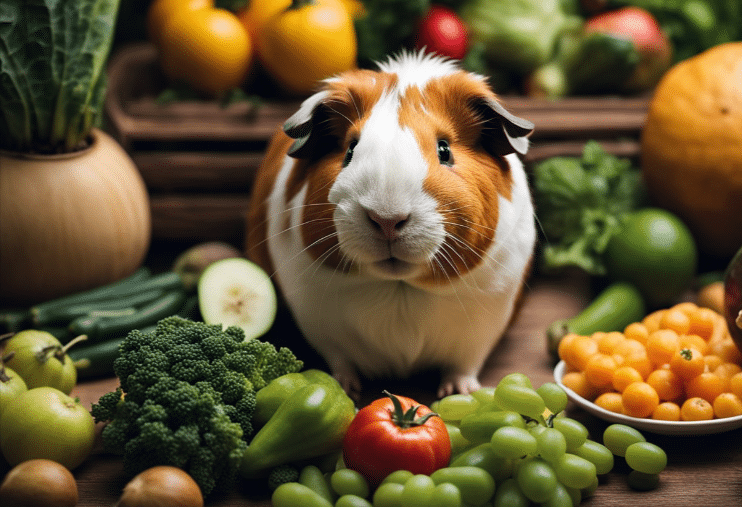
Obesity and Weight Management
Guinea pigs can indeed eat a lot, which can lead to obesity if not properly managed. To maintain a healthy weight, ensure your guinea pig receives a balanced diet consisting of hay (80% of their diet), fresh vegetables and herbs (10-15%), and pellets (5-10%).
Also, provide an unlimited quantity of fresh grass hay daily to promote healthy digestion. Monitoring your guinea pig’s weight regularly can help you identify and address any potential weight issues early on.
Dental Disease
Dental disease is a common concern for guinea pigs, as their teeth continually grow throughout their lives. Providing a diet rich in hay not only benefits their digestion but also helps to limit the growth of their teeth. Chew toys made from wood or other natural materials can also help prevent overgrown teeth. If you notice any changes in your guinea pig’s eating habits, such as difficulty chewing, consult your vet to check for dental issues.
Gastrointestinal Issues
Guinea pigs have sensitive digestive systems, making them prone to gastrointestinal issues. Feeding them an appropriate diet plays a crucial role in maintaining good gastrointestinal health.
In particular, it is important to avoid feeding them excessive amounts of fruits or vegetables high in sugar, as this can lead to diarrhea or other digestive problems. Introduce new foods gradually and monitor your guinea pig’s feces for any signs of digestive upset.
If you suspect your guinea pig is suffering from gastrointestinal issues, contact your vet for guidance.
In addition to dietary concerns, there are other health issues to be aware of for guinea pigs, such as scurvy (due to a lack of vitamin C). By maintaining a balanced diet and monitoring your guinea pig’s health, you can proactively address potential health concerns and ensure the wellbeing of your pet.
Safe Treats and Snacks
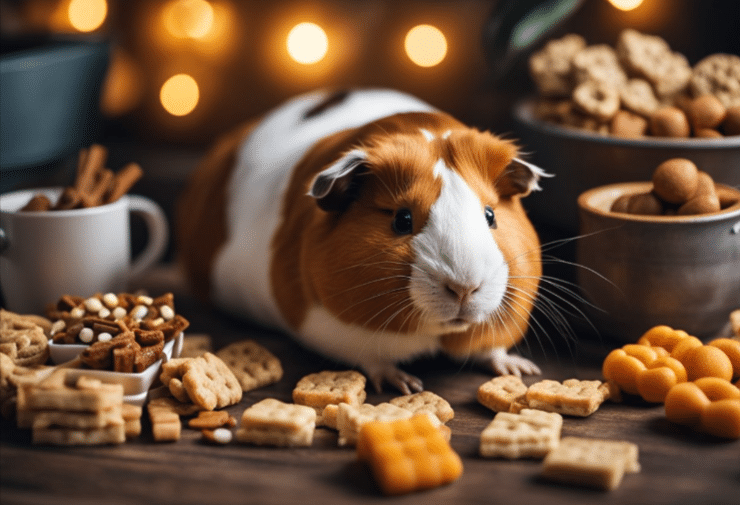
Healthy Treat Options
When it comes to offering your guinea pig some treats, it’s important to provide them with healthy options.
Vegetables are a great choice, as they can be a part of your guinea pig’s daily diet. Offer a variety of vegetables like bell peppers, carrots, cucumbers, kale, and romaine lettuce to keep things interesting for them.
Guinea pigs can also enjoy fruits in moderation. Some suitable fruits include apples, strawberries, bananas, and melons.
However, it’s essential to limit their fruit intake due to the sugar content. In addition to fruits and vegetables, guinea pigs can enjoy hay cubes, shredded wheat cereal, and unsalted nuts like almonds or walnuts.
Limiting Sugar and Calories
It is crucial to monitor the sugar and calorie intake of your guinea pig to maintain their health. Fresh fruits should be offered sparingly, as they contain higher sugar levels compared to vegetables. Dried fruits should be avoided due to their high sugar content and potential choking hazard.
Reduce sugar and calorie intake by:
- Limiting fruit intake to 1-2 small portions per week.
- Providing a variety of leafy greens and vegetables with lower sugar content.
- Avoiding store-bought treats high in sugar, calories, or artificial ingredients.
- Keeping the dietary balance focused on hay consumption, which should make up 80-85% of their daily intake.
By ensuring a balanced diet and offering safe, low-sugar treats, you can keep your guinea pig healthy and satisfied while maintaining their optimal weight.
Footnotes
Feeding Habits and Quantity
Guinea pigs are known for their hearty appetites, consistently munching throughout the day. As a guinea pig owner, it’s important to understand their feeding habits to ensure they receive adequate nutrition.
Aside from these staples, your guinea pig can enjoy occasional treats in the form of fruits, such as small apple slices or blueberries. However, moderation is key, as excessive sugar can negatively impact their health.
Remember to provide fresh water for your guinea pig at all times, ensuring they stay hydrated and facilitating the digestion of their fibrous diet.
Monitoring your guinea pig’s food intake and adjusting it according to their needs plays a crucial role in promoting their overall well-being. Establishing optimal feeding habits will not only satisfy their appetite but also contribute to a happy, healthy pet.
Routine Veterinary Care
As a guinea pig owner, you should ensure that your pet receives proper veterinary care to maintain good health. Regular visits to a veterinarian familiar with guinea pigs at least once a year are recommended for routine checkups. Handling your guinea pig daily allows you to bond while also assessing its general well-being.
Guinea pigs do not require vaccinations. However, they are prone to certain diseases and parasites, which warrant attention.
For instance, lice and mites can cause discomfort, and you must consult a veterinarian for the appropriate treatment. Unlike some parasites, lice and mites are not contagious to humans. A knowledgeable veterinarian will guide you on how to prevent and treat these issues.
In addition to regular check-ups, proper nutrition plays a vital role in guinea pig health. Feed your pet quality commercial guinea pig pellets daily. Avoid overfeeding, as obesity can lead to health problems.
Instead, opt for a high-fiber, timothy-based pellet, alongside unlimited access to timothy or low-calcium hay.
Your guinea pig also requires fresh water every day, consuming between 50ml – 300ml of water on average. A water bottle for guinea pig cages typically holds around 16 oz, so one guinea pig will drink about 2oz to 10oz daily. Make sure that your guinea pig is well-hydrated.
Monitoring your guinea pig’s weight, fur condition, and behavior helps you identify any potential health issues early. A qualified veterinarian will advise you on managing these concerns before they become severe, ensuring your guinea pig stays happy and healthy.
Conclusion
In conclusion, a healthy guinea pig diet is centered on high-quality hay, fresh vegetables, limited fruits, and specialized pellets.
Each guinea pig’s dietary needs may vary based on their age, size, and activity level. Regular veterinary care, alongside careful monitoring of their diet and hydration, is key to preventing health issues and ensuring the overall well-being of your furry friend. Remember, a balanced diet is the foundation of a happy, healthy guinea pig.

